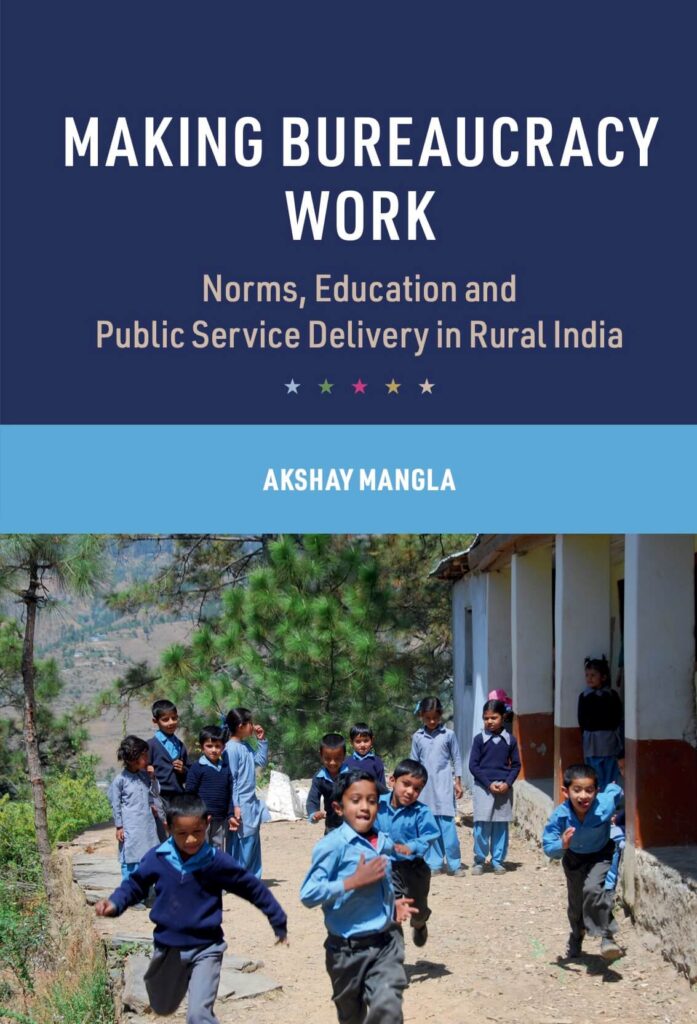Making Bureaucracy Work: Norms, Education and Public Service Delivery in Rural India
Cambridge University Press (2022)
Cambridge Studies in the Comparative Politics of Education Series
Global edition: CUP | Amazon | Amazon UK
India edition: Permanent Black | Amazon India
Videos: Book Launch Video (Skoll Centre, Oxford), Sol Price School (USC), Blavatnik School of Government (Oxford), Institute for Innovation and Public Purpose (UCL)
Podcasts: Grand Tamasha | In Pursuit of Development
Summary
What makes bureaucracy work for the least advantaged? Across the world, countries have adopted policies for universal primary education. Yet, policy implementation is uneven and not well understood. Making Bureaucracy Work investigates when and how public agencies deliver primary education across rural India. Through a multi-level comparative analysis and more than two years of ethnographic field research, Mangla opens the ‘black box’ of Indian bureaucracy to demonstrate how differences in bureaucratic norms – informal rules that guide public officials and their everyday relations with citizens – generate divergent implementation patterns and outcomes. While some public agencies operate in a legalistic manner and promote compliance with policy rules, others engage in deliberation and encourage flexible problem-solving with local communities, thereby enhancing the quality of education services. This book reveals the complex ways bureaucratic norms interact with socioeconomic inequalities on the ground, illuminating the possibilities and obstacles for bureaucracy to promote inclusive development.
Awards
- Co-Winner: 2024 Francine Frankel Best Book Prize, South Asian Politics Section, American Political Science Association
- Winner: 2024 W.J.M MacKenzie Book Prize, Political Studies Association
- Finalist: 2024 George R. Terry Book Award, Academy of Management
- Winner: 2023 Best Book Award, International Public Policy Association
- Winner: 2023 Best Book Award, Public and Non-profit Division, Academy of Management
- Winner: 2023 Charles H. Levine Memorial Book Prize, International Political Science Association
- Honorable Mention: 2023 Best Book Award, Education Politics and Policy Section, American Political Science Association
- Honorable Mention: 2023 Outstanding Book Award, Sociology of Development Section, American Sociological Association
Book Reviews
- Contemporary South Asia
- Harvard Education Review
- South Asia Reading Group, Center for Contemporary South Asia, UC Berkeley
Endorsements
“In this book, Dr Mangla asks how bureaucracy can work in difficult conditions to deliver programs that especially benefit disadvantaged populations...The public administration literature typically assumes that weak or politicized bureaucracies tend to undermine the state’s capacity to implement public services like primary education. However, on the basis of a detailed comparative research program, Dr Mangla argues that bureaucratic organizations can operate in ways different from the Weberian model, and that there is a wide spectrum of effectiveness. Dr Mangla demonstrates the impact of informal norms and culture on public service delivery and citizen relations. He identifies the different types of bureaucratic norms, some of which go beyond legalistic rules to enable effective coordination and deliberation at local levels...Dr Mangla’s book provides a refreshing reconsideration of some basic questions in policy studies, public administration, and social engagement. He shows how the standard assumptions of western scholarship may struggle to explain the nuances of experience in the Global South. The book is an outstanding contribution to the study of bureaucratic norms and public policy implementation, especially for developing countries.“
International Public Policy Association, Best Book Award Committee
“In Making Bureaucracy Work, Mangla delves deeply into the local implementation of education policy in some of India’s poorest states to ask when governments are able to deliver social services to their citizens and, ultimately, to improve social outcomes. His novel answer to this vitally important question focuses on how bureaucratic norms, which vary markedly across different localities, drive better implementation of government education policies. Paradoxically, a commitment to ‘legalism,’ which compels bureaucrats to strictly enforce rules and administrative hierarchies, can hinder school monitoring, among other tasks, reinforcing inequalities, whereas norms of ‘deliberation’ are more flexible, encouraging pragmatic responses to policy challenges. Based on deep ethnographic research, Mangla zooms into the local politics of service delivery in ways that few scholars have done, advancing our knowledge of how social outcomes actually improve – or fail to improve – on the ground.“
Melani Cammett, Clarence Dillon Professor of International Affairs, Harvard University
“For all that has been written about the Indian state, we have never really understood how the bureaucracy works. Until now. Mangla’s book not only unpacks the Indian state, but through his empirically rich and rigorously crafted comparative analysis of the education bureaucracy in subnational states he shows us how and why bureaucracies can utterly fail and when they become agents of inclusive development.“
Patrick Heller, Lyn Crost Professor of Social Sciences, Department of Sociology, Brown University
“This meticulously researched book addresses one of the deepest puzzles about Indian development, the early neglect of basic education, and its later (partial) correction. Using a variety of empirical methods and sources, the book highlights the role of bureaucratic norms in policy implementation and outcomes and provides a novel and richly textured understanding of state capacity.“
Devesh Kapur, Starr Foundation Professor of South Asian Studies, Johns Hopkins University
“Social norms are the glue and grease of every organization, from families and communities to corporations and governments. Yet the origins, durability and effects of social norms are remarkably understudied. In this path-breaking book, Akshay Mangla documents the decisive role that implementation systems characterized by legalistic and deliberative social norms play in shaping the wide variation in learning outcomes across primary schools in north India. Mangla takes us on an engaging and instructive journey across different interacting layers of carefully matched locations to tease out where, how and when social norms create or shrink space for problem-solving and innovation. The implications of his findings are of first-order importance not only for Indian policymakers seeking to enhance learning outcomes for millions of students, but for all those forging new ways to build state capability for policy implementation.“
Michael Woolcock, World Bank and Harvard University, Co-author of Building State Capability
